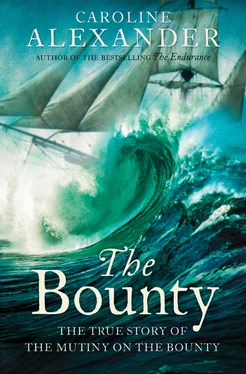‘I have always directed the Evenings from 5 to 8’ O’Clock to be spent in dancing,’ Bligh registered with a tone of aggrieved self-righteousness in his log, ‘& that every Man should be Obliged to dance as I considered it conducive to their Health.’
Only hours later, Bligh had to log a second entry about the incident: ‘Wm Brown complaining of some Rheumatic Complaints which he has had these three Weeks past, the Doctor insists upon it that it is Scurvey.’ So Brown, it seems, had turned to the doctor for moral support. Bligh himself, however, could discover no such symptoms. Determinedly, he pushed forward with his ‘decoctions’ of essence of malt, noting, ‘I have Ordered the Doctor to issue it himself.’
‘If able,’ he had added in the original entry of his private log, which also noted that Huggan had been ‘constantly drunk these last four days.’ Towards the end of this frustrating Sunday, all hands were mustered for the usual inspection.
‘I think I never saw a more healthy set of Men and so decent looking in my life,’ Bligh exclaimed in exasperation to his log. Bligh knew what scurvy looked like and could find no symptoms – no ‘eruptions or swellings’, no bleeding gums or loose teeth. Yet the real interest in this protracted incident, of course, has less to do with whether or not there was scurvy on the Bounty than whether or not Bligh was being toyed with. Was Huggan getting back at Bligh for his anger over Valentine’s death with a vindictive but unassailable diagnosis of the disease Bligh most feared – a gambit instantly appreciated and exploited by the appreciative and all-knowing seamen?
On 23 October, Huggan sent Bligh an updated sick list, with his own name on it under the complaint ‘Rheumatism’. Twenty-four hours later, he issued a revised list that gave his complaint as ‘Paralytic Affection’. Later in the same day, however, as Bligh noted, Huggan was ‘discovered to be able to get out of bed and look for liquor,’ his paralysis notwithstanding. With this, Bligh’s patience snapped and he gave orders for the surgeon’s filthy cabin to be searched and all liquor removed, an ‘operation that was not only troublesome but offensive in the highest degree.’ Successfully deprived of alcohol, Huggan made a shaky appearance on deck the next day, tenuously sober. The timing of his recovery was excellent, as the Bounty was less than a day away from Matavai Bay and only hours away from sighting land. Bligh urgently wished his surgeon to perform one important medical office before landfall. Ever since the first European ship had arrived at Tahiti, sailors had infected the islanders with ‘the venereals’; the French claimed the English were responsible for the devastation the disease had wrought, while the English pointed out that the Tahitians themselves had implicated the French. Bligh wanted Huggan ‘to examine very particularly every Man and Officer’ for any sign of the disease before arriving at the island. Huggan did so and, to the universal joy of the company, declared ‘every person totally free from the Venereal complaint.’
The next day brought the Bounty to Tahiti.
Beneath the island’s volcanic pinnacles, the Bounty passed around the surf-pounded reef beyond Point Venus. Already she was hailed by throngs of canoes; and when Bligh called out that he had come from Britain, or ‘Pretanee’, the delighted islanders swarmed onto the ship, ‘and in ten Minutes,’ wrote Bligh, ‘I could scarce find my own people.’ The old-timers – Nelson, the gardener, William Peckover, the gunner, armourer Joseph Coleman and Bligh himself – greeted and were greeted with warm recognition. The remainder of the crew now learned that the stories that had filled their ears throughout the long, hard outward voyage – about the island’s beauty, its sexually uninhibited women, its welcoming people – were not tall tales, or sailors’ fantasy. Beyond the ship, its undulating slopes and valleys, gullies and dramatic peaks casting shifting green-blue shadows in the morning sun, rose the vision of Tahiti. Below, the blue sea around them was clogged with cheerful canoes that had come laden with gifts of plantains, coconuts and hogs. And filling the deck, milling and laughing around them, were the tall, clean-limbed, smooth-skinned Tahitians. The Bounty men – bowlegged, pockmarked, scarred and misshapen, toothless and, despite Bligh’s best efforts, very dirty – regarded the improbably handsome, dark-haired. islanders with both appetite and awe. Their brown skin gleaming with perfumed oil, garlanded with flowers, and flashing smiles with strong white teeth such as few Englishmen had ever seen, these superior men and women were also friendly and accessible. Significantly, all cases of scurvy were quickly cured; even Morrison allowed ‘that in a few days of arrival there was no appearance of sickness or disorder in the ship.’
The following day, 27 October, manoeuvring around canoes and people, Bligh successfully worked the Bounty into Matavai Bay, and dropped anchor. Under the escort of a chief named Poeno, Bligh was taken to Point Venus, the peninsula that formed the northeast point of Matavai Bay, from where in 1769 Cook had observed the transit of Venus. Standing under the graceful and now familiar coconut palms, the surf breaking against the lava-black beach, Bligh seems to have drawn a deep breath of happiness.
It had been Bligh’s original plan to conceal Captain Cook’s death from the Tahitians; Cook was held in such high esteem that a portrait of him, left as a gift eleven years earlier, was still in good repair. But some three months before the Bounty’s arrival, another foreign ship – apparently the first since Cook’s departure – had brought news of his terrible death at the hands of the Sandwich Islanders. Nonetheless, David Nelson – with or without Bligh’s prompting is unclear – introduced Bligh as ‘Cook’s son’ to the local dignitaries; they are reported to have received this news with much satisfaction, although subsequent interactions suggest this was not perhaps taken by them as a literal truth.
On 1 November, Bligh set out on a scouting trip to Oparre, a district to the west of Matavai. In order to uproot and carry off the large number of breadfruit he sought, he needed the permission of all the various chiefs with jurisdiction over the areas in which he would be working. A visit to pay his respects to the Ari’i Rahi, the six-year-old king of Oparre, took him inland towards the hills, ‘through the delightful breadfruit flats of Oparre,’ which were cut by a serpentine river. In the course of the day, the two parties entertained each other, the Tahitians offering an impromptu heiva , or dancing festival, Bligh a demonstration of his pocket pistol.
Before returning to his ship, Bligh contemplated the scenes of the day – the sparkling streams and green glades of the interior, and the dramatic sweep of the palm-rimmed lava beach of Matavai Bay. ‘These two places,’ he reflected, ‘are certainly the Paradise of the World, and if happiness could result from situation and convenience, here it is to be found in the highest perfection. I have seen many parts of the World,’ he continued in this remarkably personal entry, ‘but Otaheite is capable of being preferable to them all.’
Tynah, the paramount chief of Matavai and the adjoining region, soon became the local dignitary with whom Bligh and his men had the most communion. He and his outgoing wife, Iddeeah, were both large, impressive persons, Tynah standing over six foot three and weighing some twenty-one stones. Now around thirty-seven years old, Tynah had been known to Cook and Bligh previously as ‘Otoo’. Adroitly, Bligh conveyed to Tynah and the other lesser chiefs that the gift his sovereign, King George of Pretanee, would most welcome in exchange for the gifts his ship carried was the breadfruit tree. Delighted that King George could be so easily satisfied, the chiefs readily gave their assent, and Bligh, much relieved, began to organize his land base.
Читать дальше












